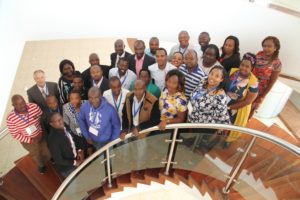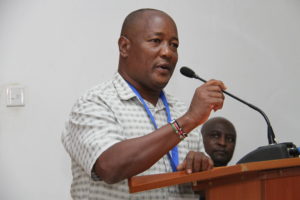Texas State Chemist Office continues aflatoxin assistance in Kenya

(University of Nairobi photo)
Media contact: Blair Fannin, 979-845-2259, [email protected]
COLLEGE STATION – Dr. Tim Herrman, state chemist and professor at Texas A&M University in College Station, and academia representatives from Kenya recently conducted a workshop with dignitaries from Meru County, Kenya to collaborate in developing a plan to manage aflatoxin.
The workshop included assembly members, executives of agriculture and public health agencies and private sector representatives.

“Texas shares a common problem involving aflatoxin risk management to protect animal, human and market health,” Herrman said. “This collaboration is looking for the best methods to mitigate risk and improve overall food safety and health.”
Aflatoxin is a toxic fungal metabolite classified as a Group I carcinogen and occurs naturally in corn and other food staples, Herrman said.
“Our people are facing easy deaths,” said Paul Mworia Bagiine, chairman of Agriculture, Livestock and Fisheries Committee, County Assembly of Meru. “I am glad and grateful that this project has taken place and that the people of Meru County are not going to die anymore from the poison in their food.”
“The University of Nairobi in collaboration with Texas A&M has been doing some research work since 2016 in Meru,” said Francis Mulaa, professor and director, intellectual property management office at the University of Nairobi. Mulaa was representing the Deputy Vice Chancellor of research, production and extension, professor Madara Ogot.
“The county officials heard of the project from a partner from the Cereal Growers Association,” Mulaa said. “The county wants to hear about the findings of research we have carried out so far (aflatoxin status) and to use these findings to apply to an aflatoxin management bill.”
Mulaa said the Meru County government is interested in adapting drafted legislation that the University of Nairobi and Texas A&M team facilitated with all relevant stakeholders including public, private sector representatives, national government bodies, consumers, producers and processors. The workshop builds on a series of high-level policy sessions and action research across all phases of the market sector in Kenya.
A contingent of Kenya parliament members met in 2017 at Texas A&M in College Station to discuss developing plans to manage aflatoxin (http://bit.ly/2WpREnR ).
The most recent workshop was an outgrowth of a collaborative research project between Dr. Sheila Okoth, associate professor of botany at the University of Nairobi, and Herrman, also of Texas A&M AgriLife Research. The Centre for Biotechnology and Bioinformatics on the University of Nairobi Chiromo campus, directed by Dr. George Obiero, serves as the host platform for this collaborative effort.
At the close of the workshop, government and industry leaders developed a roadmap to manage aflatoxin risk in Meru County.
Other stories about Texas A&M AgriLife Research efforts to manage aflatoxin risk in eastern and southern Africa involving the Aflatoxin Proficiency Testing and Control in Africa program are available at: http://apteca.tamu.edu/.


